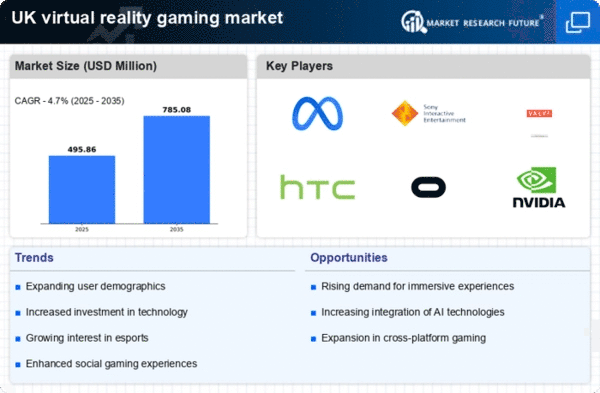Expansion of VR Gaming Communities
The virtual reality-gaming market is experiencing an expansion of gaming communities, which is fostering social interaction among players. Online platforms and forums dedicated to VR gaming are becoming increasingly popular, allowing users to share experiences, tips, and gameplay strategies. In the UK, the growth of these communities is likely to enhance player engagement and retention, as gamers seek to connect with like-minded individuals. This social aspect of VR gaming may encourage more people to participate, thereby broadening the market's reach. As communities continue to grow, they could play a pivotal role in shaping the future of the virtual reality-gaming market, influencing trends and consumer preferences.
Rise of Competitive Gaming and Esports
The virtual reality-gaming market is increasingly influenced by the rise of competitive gaming and esports. This trend is fostering a community of gamers who seek immersive experiences that VR can provide. In the UK, esports viewership has grown substantially, with millions tuning in to watch competitive events. The integration of VR into esports is likely to attract new players and audiences, enhancing the overall appeal of the virtual reality-gaming market. Furthermore, the potential for VR tournaments and competitions could lead to increased investment in VR gaming technologies, thereby stimulating market growth. As the esports industry continues to expand, it may create new opportunities for VR game developers and publishers, further solidifying the market's position.
Technological Advancements in VR Hardware
The virtual reality-gaming market is experiencing a surge in hardware development. Innovations such as improved graphics processing units (GPUs) and lightweight headsets are enhancing user experiences. For instance, the introduction of high-resolution displays and advanced motion tracking systems is making VR gaming more immersive. In the UK, the market for VR headsets is projected to grow at a CAGR of approximately 25% over the next five years. This growth is driven by consumer demand for high-quality gaming experiences, which is likely to propel the virtual reality-gaming market further. As hardware becomes more sophisticated and affordable, it is expected that a broader audience will engage with VR gaming, thereby expanding the market significantly.
Growing Interest in Immersive Storytelling
The virtual reality-gaming market is witnessing a growing interest in immersive storytelling, which is reshaping how narratives are delivered in games. Developers are increasingly leveraging VR technology to create engaging and interactive storylines that captivate players. This trend is particularly evident in the UK, where consumers are seeking unique gaming experiences that go beyond traditional gameplay. The demand for narrative-driven VR games is likely to drive innovation within the industry, as creators explore new ways to engage players emotionally. As a result, the virtual reality-gaming market may see a rise in titles that prioritize storytelling, potentially attracting a wider audience and enhancing market growth.
Increased Investment in VR Game Development
The virtual reality-gaming market is benefiting from increased investment in game development, with established companies and startups recognizing VR's potential. In the UK, funding for VR projects has surged, with numerous developers seeking to create innovative gaming experiences. This influx of capital is likely to lead to a diverse range of VR titles, catering to various consumer preferences. Moreover, as more developers enter the market, competition is expected to intensify, driving quality and creativity in game design. The growing investment landscape may also encourage collaborations between technology firms and game developers, further propelling the virtual reality-gaming market forward.















